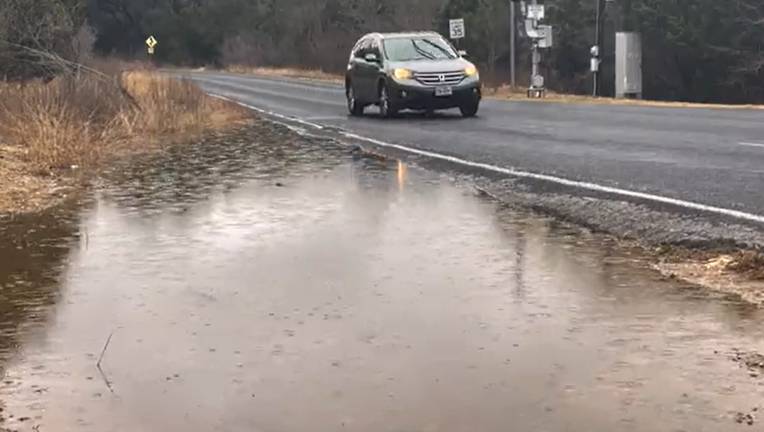TxDOT releases safety tips for drivers as storms become more frequent

(TxDOT)
TEXAS - As spring brings on showers and storms, TxDOT is offering safety tips for drivers that could help save lives in the event of flash flooding.
According to TxDOT, Flash floods are the leading cause of weather-related deaths in Texas.
TxDOT shared tips to keep drivers safe:
- Driving can be extremely dangerous during flash flooding; about 75% of flood related fatalities in Texas happen in vehicles.
- As little as six inches of fast-moving water—enough to barely touch most people’s lower legs or cover their ankles—can cause drivers to lose control of a vehicle, even a pickup truck or SUV.
- Flood waters also may be hiding dangers such as debris, tree branches, power lines or road damage that can seriously impair a vehicle and harm or even kill drivers and passengers.
- It’s the law! Heed warning signs or face serious legal penalties. State law requires drivers to heed barriers blocking low water crossings or flooded roadways or face a fine of up to $2,000 and/or up to 180 days in jail.
- Anyone who tampers or removes a roadway warning sign or barricade can face a fine of up to $1,000, up to two years in jail, or both.
Keep yourself and your passengers safe in areas experiencing heavy rain or flooding by following these safety tips:
- Stay informed about weather conditions. Check DriveTexas.org for up-to-date driving conditions.
- Never drive through still or moving flood waters. Turn around, don’t drown!
- Reduce your speed, drive to conditions and turn off cruise control.
- Be especially careful driving at night, when it can be harder to see flood dangers.
- If your vehicle stalls in flood waters, and if you can do so safely, leave it and move to higher ground.
DOWNLOAD: FOX 7 AUSTIN NEWS APP

TxDOT urges drivers to pay attention to roads after increase in traffic deaths
TxDOT’s "Talk.Text.Crash." campaign brings awareness and urgency to reduce distracted driving in Texas.
SUBSCRIBE: FOX 7 Daily Newsletter | FOX 7 Austin YouTube
What steps can drivers take to prepare for traveling in inclement weather?
- If dangerous weather is in the forecast, consider delaying your travel or simply stay home.
- If you must travel in dangerous weather, know what to expect. Check weather forecasts beforehand, and visit DriveTexas.org (or call 800-452-9292) to find out about highway and road conditions on your planned route.
- Follow TxDOT on Facebook and Twitter for updates on weather conditions and road closures.
- A flash flood watch means flash flooding is possible within the designated watch area, and a flash flood warning means flash flooding has been reported or is imminent.
- Check your vehicle’s battery, tires and windshield wipers, and make sure you have plenty of gas to account for travel delays. Carry an emergency kit in your vehicle, just in case.
What else can drivers do to protect themselves and prevent crashes when traveling in inclement weather?
- Always buckle up. Wearing a seat belt is one of the best ways drivers and passengers can protect themselves in any driving condition.
- Reduce your speed and increase your following distance.
- Do not engage cruise control. Cruise control can quickly turn into "lose control" if you encounter standing water or other areas that affect your vehicle’s traction.
- If your vehicle starts to hydroplane, ease off the gas pedal or brakes. Stay calm and wait for the skid to stop.
- Stay alert. No matter the driving conditions, avoid driving drowsy or after drinking alcohol, when your concentration and reactions times are impaired.
- Watch for stranded vehicles on multi-lane roads where outside lanes may be flooded.
- Anticipate travel delays, and build in extra time to reach your destination.
- is a key component of #EndTheStreakTX, a broader social media and word-of-mouth effort that encourages drivers to make safer choices while behind the wheel such as wearing a seat belt, driving the speed limit, never texting and driving and never driving under the influence of alcohol or other drugs. November 7, 2000 was the last deathless day on Texas roadways. #EndTheStreakTX asks all Texans to commit to driving safely to help end the streak of daily deaths.

